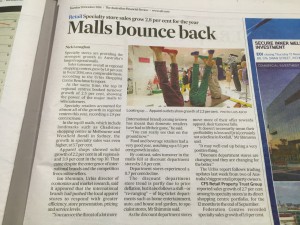How can I reduce the rent I pay for my local shop? Advice for small business retailers
You’d think that rent would be flat or declining considering the number empty shops around. Rent is not always set based on a traditional supply and demand model.
Some landlords have their funding arrangements set based on the value of the property, which is tied to the rent they are asking. Reducing the rent reduces the value of the property and this can negatively impact the funding they have in place.
I talk to many retailers who ask for advice on how to negotiate to pay less rent. These conversations can be frustrating when the retailer has been told by someone that they can get a rent reduction for them, often for a negotiation fee. Leasing brokers and some others who negotiate rent for retailers usually charge a fee for their services with the fee not tied to a successful negotiation.
My advice on how to negotiate a rent reduction is always the same:
Ensure your business is appealing to the landlord: that it attracts traffic to the location, you pay your rent on time, you’re a low maintenance tenant and other retailers in the centre (if you’re in a centre) would not want you to leave.
Gather evidence supporting your case: your P&L, comparative rent for similar nearby shops, details of what you have done to improve the business and details of what makes your business unique – for example, the lack of control you may have over the price you can change for much of what you sell. In this process you may discover that your results don’t support a reduction in rent.
Have a plan b: another location from where you can operate if you had to. The old adage of location location location is not as relevant today with plenty of revenue for a god shop coming from online. Relying less on a perfect location that delivers traffic to you gives you options. Having another location in mind also depends on you configuring your business to be one that is sought out – that people will come to you. Keep and plan b you develop to yourself.
Make your case early: write to the landlord, in a professional and nun emotive tone. Be clear in your ask. Don’t waffle. Make your pitch compelling. There has to be something in your pitch for the landlord. This pitch best comes from you as you’re the person who has the most on the line – a leasing broker is paid to spend time on your behalf.
The most common mistake I see a retailer make us believing that they should play less rent because they think they should. This is a dangerous mistake.
Another mistake is that the business is declining and less able to pay the rent. A business declining is the responsibility of the retailer to resolve and not the landlord to fix by reducing rent.
There is no common trajectory in terms of rent for retail locations in Australia. The situation varies by state and region, type of location and more. In Perth and Brisbane, for example, CBD retail vacancy rates of 21.7% and 18.3% respectively. There is no national trend on which you can rely.
Recent data from the first half of 2025 indicates that the national CBD retail vacancy rate has decreased to 11.1%, the lowest it has been since the first half of 2021.
How can you reduce the rent you pay for your local shop? The answer is to start planning early and to take responsibility yourself for working what is one of the highest operating costs in your business.
…
Mark Fletcher founded newsagency software company Tower Systems and is the CEO of newsXpress, a marketing group serving innovative newsagents keen to evolve their businesses for a bright future. You can reach him on mark@newsxpress.com.au or 0418 321 338.

